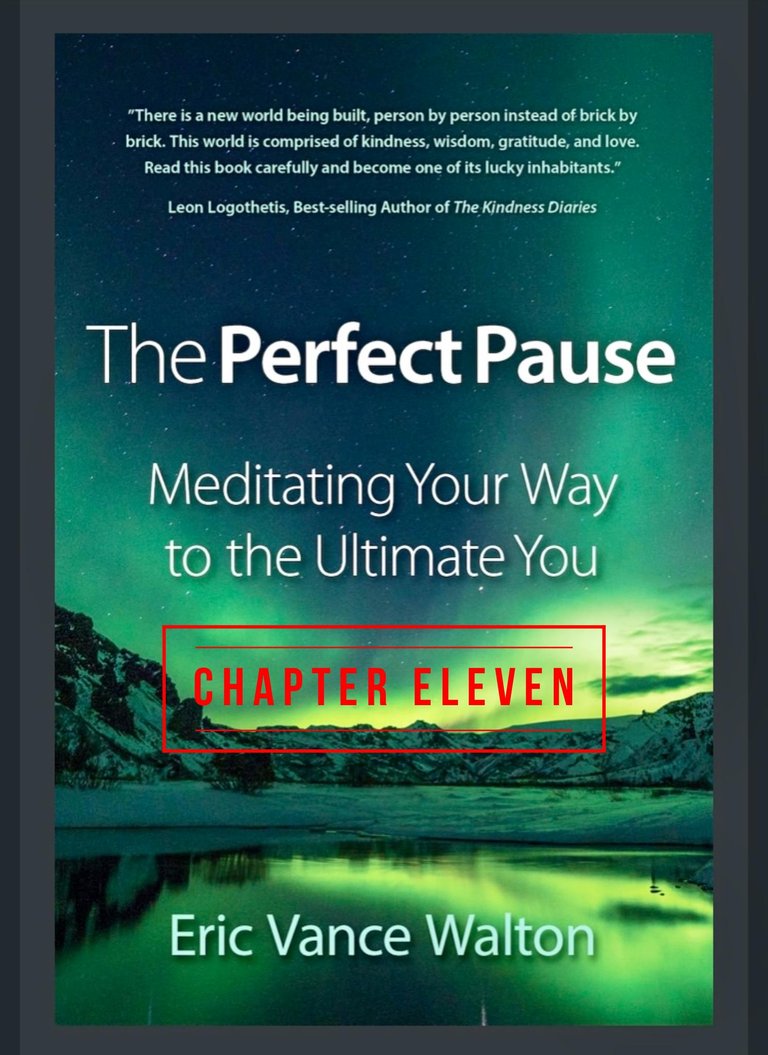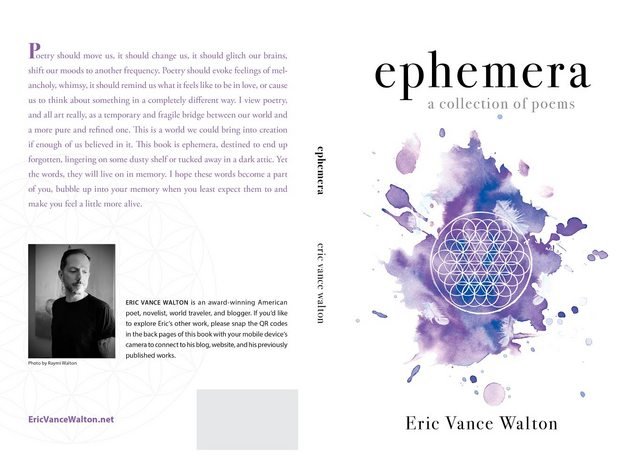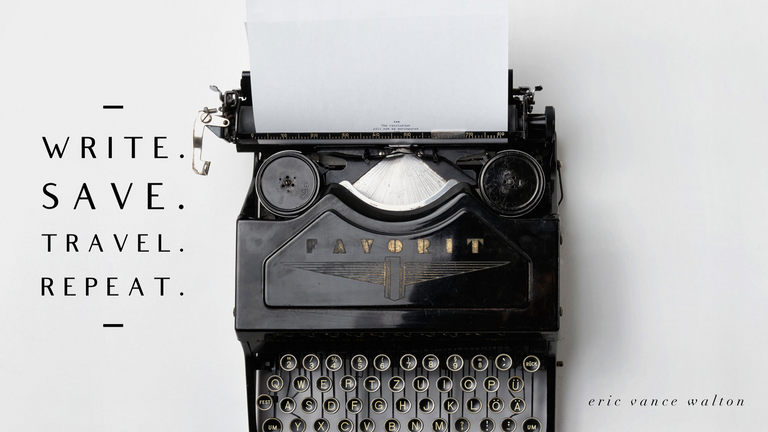
Chapter Intro
Only two more chapters to go. If you’ve followed this far you now have a firm foundation on which to build a lifelong practice of meditation. Practice this for seven days and I can guarantee it will become a habit, one that will pay dividends for the remainder of your life and beyond.
Read on...
Chapter Eleven
What exactly is meditation?
It's learning to be completely and wholly present in the moment.
It sounds simple, doesn’t it?
I guarantee there are a few of you who thought to yourself a few chapters back, “Okay I’ve read all these chapters and still haven’t learned how to meditate!” Don’t worry, there’s a method to my madness. This chapter appears near the end of the book for a reason. If you’ve made it this far, you have a real interest in trying to integrate the true miracle of meditation into your life. Those who didn’t make it this far either didn’t connect with the book or weren’t ready for the commitment a mindful life requires. These folks will soon be writing a scathing review of this book on Amazon (and that’s okay).
“Learn to be calm and you will always be happy.” -Paramahansa Yogananda
Some who’ve made it this far will put forth a little effort, try meditation half-heartedly for a while, and will quit.
A select few will leap into their meditation practice enthusiastically with both feet. They will experience meditation’s many benefits, it will change them, and they will go on to be a proponent of it. They will become a gift to all of us; a positive light that shines as a beacon through the darkness of our world. These are the people for which I wrote this book.
For the benefits of meditation to take root, you must believe in it enough to prepare your life, your soul, your consciousness for this practice. If you do this, meditation will become the calm center that will allow you to weather any storm. This chapter is short but will teach you all you need to know to begin your practice. It’s up to you to do the work and practice every single day.
“When you truly know yourself, you don’t try to impress people anymore. One way to know yourself is to meditate.” -Maxime Lagacé
A meditation practice is hard at first, but after a while you will find you look forward to your practice. A little more time will pass and you will find you can’t live without it. You will purposely carve time out of your day to practice meditation and when you miss it you will ache for it. Now, let’s begin.
Your Space
First and foremost, it helps to have a small area dedicated to meditation practice. This can be a spare bedroom or even a small corner separated with a screen but it should be a space that is quiet and with dim light. You should expect your meditation space to be clean, comfortable and free from any unnecessary interruptions or distractions. Many people like to light a candle or burn mild incense but this is not necessary.
It’s most beneficial if you meditate in the same space every day. The reason for this is merely occupying this space will evoke calm memories of past meditations. This will allow you to go deeper more quickly and provide a jumpstart to your meditation practice.
Posture
Sit in a comfortable chair with your back straight, shoulders back, and feet flat on the ground. Rest the backs of your hands on the tops your thighs with palms facing upwards.
Preparing Your Body
Just as an athlete stretches before a game before each meditation session it is best to limber up so you don’t feel any pain or stiffness during your session and so the energy can flow freely throughout your body. The following exercises will help you achieve a more fruitful meditation experience:
Seated in a chair with your arms straight up in the air reach for the ceiling and elongate your spine. While stretching, rotate your wrists five times and wiggle your fingers for a count of five.
Roll your head slowly and fluidly in one direction five times and then five times in the opposite direction.
Your Practice
There are many styles and types of meditation. The purpose of this book is merely to usher you to the path, to introduce you to the basics. Meditation is just that, practice. These exercises can be done at any time of the day but ideally your meditation routine should be for a few minutes after you wake up and a few minutes just before bedtime.
“When you realize there is nothing lacking, the whole world belongs to you.” -Lao Tzu
Ultimately, the important part is to do it, so it is for you to decide how to integrate it into your life. Start with an amount of time that you can devote every day, even if it’s five minutes. After you begin to experience how much value this adds to your life, you’ll want to gradually lengthen the duration of your practice.
Exercise One - Proper Breathing
This first exercise can be performed seated in a comfortable chair or laying flat on the floor. You should try to keep the spine as straight as possible. I urge you to try this (and only this) exercise for fifteen minutes per day for the first week of your meditation practice. This will give you a proper foundation to build upon.
Bruce Lee said, “I fear not the man who has practiced ten thousand kicks but I fear the man who has practiced the same kick ten thousand times.”
Mr. Lee realized that by practicing the same simple task again and again, it allows you to eventually perform it perfectly without even thinking about it. I can’t stress this enough: proper breathing is the foundation of successful meditation and keeping your consciousness tethered to the present moment.
Let’s give it a try:
With eyes closed, inhale through your nose for a slow count of five, hold for a count of five, then exhale through your mouth for a count of seven. Breathe slowly and deeply, again inhale for a count of five, exhale for a count of seven.
Now, place your open palm on your abdomen. Breathe deeply enough so you can feel your belly rise and fall with each breath.
Concentrate fully on the quality and the fullness of each breath. Repeat this for fifteen minutes per day or longer if you’d like.
This breathing exercise trains the mind to stay in the present moment but it’s not always as easy as it seems. Your mind will inevitably try to wander but each time it does acknowledge the thoughts that pop into your head and gently release them. Usher your attention back to your breath.
Not keeping our minds in the here and now is the source of much of the stress in our lives. Living in regret of past mistakes or fear of the future has no value. It only keeps us from experiencing the joy that is happening in our lives right now.
Exercise Two – Psychological/Cleansing
This exercise is best practiced in the seated meditation posture directly after Exercise One.
With eyes closed, place the index finger of your dominant hand directly at the point between your eyebrows. Feel the light pressure of your finger on your forehead and focus your attention directly at this point. Remove your finger but keep your internal attention there. This is where you want to focus your attention during every meditation.
Focus at the point between your eyebrows and imagine your head surrounded by warmth and light. Hold this thought in your imagination for a few moments. Envision this healing light as a bubble that expands with each of your deep exhalations until the light slowly surrounds your whole body.
As you inhale deeply, in your mind’s eye, envision the light entering your lungs and gradually permeating every cell in your whole body. Breathe the healing light.
Finally, imagine your whole body glowing. Linger in the warmth and the light with eyes closed, with your attention focused at the point between your eyebrows, concentrating on your long, deep breaths, as long as you’re able.
During this exercise, make a mental effort to address any stresses or problems in your life. Feel as though the light is vaporizing them, burning them away. If you have any aches or pains concentrate on the specific body part that needs healing. With several repetitions, mental stress will begin to subside and you will feel more at ease.
Exercise Three – Spiritual/Connecting
Close your eyes and gently focus your eyes to the point between your eyebrows. This will feel a little uncomfortable at first but after a while will seem more natural.
Inevitably your mind will race in rebellion for the mere fact that it’s used to being constantly bombarded by stimuli for so many hours of your day. This flood of thoughts is perfectly normal and is your first hurdle on your way to deep meditation. When thoughts come into your mind, don’t fight them but acknowledge their presence and simply release them. Let the thoughts go.
Hold the breath for a count of 5
Exhale through the nose for a count of 7;
Hold for 5; and
Exhale for 7.
Repeat these as many times as you’d like throughout the day.
These exercises are all you need. Practice them twice per day for a month and you will begin to experience a beautiful and amazing change in your life.
Putting It Into Practice
Record the progress of your practice in the Notes section of this chapter. List any positive experiences during your practice and any benefits you notice in your life as a result of your practice.
All for now.
With Gratitude,
Eric Vance Walton

Poetry should move us, it should change us, it should glitch our brains, shift our moods to another frequency. Poetry should evoke feelings of melancholy, whimsy, it should remind us what it feels like to be in love, or cause us to think about something in a completely different way. I view poetry, and all art really, as a temporary and fragile bridge between our world and a more pure and refined one. This is a world we could bring into creation if enough of us believed in it. This book is ephemera, destined to end up forgotten, lingering on some dusty shelf or tucked away in a dark attic. Yet the words, they will live on in memory. I hope these words become a part of you, bubble up into your memory when you least expect them to and make you feel a little more alive.
Pick up a copy of Ephemera today on Amazon.

Most of us have experienced a moment of perfect peace at least once in our lives. In these moments we lose ourselves and feel connected to everything. I call these mindful moments. Words can’t describe how complete they make us feel.
These moments are usually fragile, evaporating in seconds. What if there was a way to train your mind to experience more of them? It’s deceptively easy and requires nothing more than a subtle shift in mindset. My new book, Mindful Moments, will teach you to be much more content despite the chaos and imperfect circumstances continuing to unfold around you. Upgrade your life experience today for only $15.99 on Amazon.com.
Let’s Keep In Touch


It's a very complete discussion of meditation. You wrote it very well, Eric. I've tried to practice it but it still doesn't seem to work good because I live in a very densely populated and very noisy area. I hope you have a wonderful day, Eric.
Thanks Eliana! I'm sorry to hear you're having a tough time finding a quiet spot. Earplugs can help with that. Have a great weekend!
You are going to laugh, but I have to share a couple of really personal things after having ready this chapter. I had a pretty strict religious upbringing, I don't regret that, it gave me a good foundation for the values and principles that I live by today. Honestly there are only a few things I would change. That being said, meditation has always been a bit of a taboo thing for me. Back in the day (and probably still somewhat today) there was a really big belief that by mediating you were brining your mind to a state that would allow demons, evil spirits, whatever to enter. It is something that was kind of lumped in with the occult and things like that I guess. I think because of that I have never been able to fully embrace meditation. That and the fact that I am ADHD. That is the other personal thing. I don't think I could make my mind be still even if I wanted to!
I wasn't aware that you had such a strict upbringing! I'm sure that gives you a unique perspective on the world. I know a few others in the crypto space who were raised in religious communities. Those two things you mention would be some big barriers to learning meditation and forming a habit. Just focusing on the conscious breathing alone might be the best path towards eventually taking the practice further (or not). Even if you do the conscious breathing every day you'll reap some of the benefits. If I remember correctly you already do that.
Yeah, I probably make it sound worse than it was. It was more focused on eliminating things that equate to vices. No one in my immediate family drinks. I didn't have my first one until I was 24. The spiritual warfare stuff isn't as intense as the Baptists or evangelicals practice, but we watched the videos in youth group (about the whole meditation/D&D/evil music thing and it kind of freaked me out. 😛
I bet that did freak you out! That would be a difficult thing to forget after being taught it at a young age. I'm glad your family accepts and supports your decision to live your life how you wish.
I don't know as though they support it, but they begrudgingly accept it. I did a quick Google search and it appears the hesitancy of meditation among Christians is a pretty common thing for a number of erroneous reasons.
Sad I come in between chapters.
It's the same way I watch movies also.
This quote is so deep, I don't know what else to say but it hit hard somewhere.
The importance of having a space and a quiet time cannot be overemphasized.
What will be your advice for people who don't have an extra room for meditation? I
No problem that you're skipping around. That's one reason I decided to post the book in chapters here on Hive.
I like that quote too! There's something to be said about having singular focus and learning something until we perfect it.
I'm in the very same situation right now. We basically live in one open space and it's hard to find privacy. Even the thought that you'll be interrupted hinders a meditation session. You have to get creative sometimes. Any small space that is partitioned and allows you privacy works. I've used walk-in closets, room dividers (like a Japanese screen), or even a parked car. When all else fails my meditation session is at night before I drift off to sleep. The house is usually quiet and people think you're sleeping anyway.
I would love to be able to reach serenity by training our souls. Constant hustle and bustle. Constant unhappiness.
I'm sorry to hear that. I hope you try these exercises, maybe they'll help?
I think finding a quite place matters. Besides, if someone caught us, how would we feel? Need an explanation? This could break the meditation.
The best time is when there is no one around.